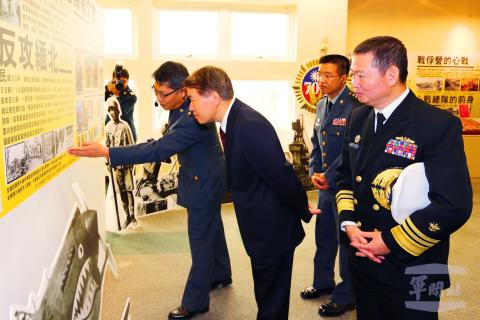US President Barack Obama on Friday signed into law the US National Defense Authorization Act for Fiscal Year 2017, which for the first time included a section on senior military exchanges with Taiwan.
The bill cleared the US Senate in a 92-7 vote on Dec. 8 after its approval in the US House of Representatives by a vote of 375-34 six days earlier.
Section 1284 of the act states: “It is the sense of [US] Congress that the [US] Secretary of Defense should conduct a program of senior military exchanges between the United States and Taiwan that have the objective of improving military-to-military relations and defense cooperation between the United States and Taiwan.”

Screengrab from the Military News Agency Web site
A “sense of Congress” is not legally binding, even though the language is included in an otherwise legally effective legislation.
It reflects the view of many on Capitol Hill who think the current level of US military exchanges with Taiwan has been insufficient.
It remains to be seen whether or how the administration of US president-elect Donald Trump will act on this section of the act.
Trump takes office on Jan. 20.
If implemented, the act stipulates that the senior military exchange program should be conducted at least once each calendar year in both Taiwan and the US.
It defines “senior military exchange” as “an activity, exercise, professional education event, or observation opportunity in which senior military officers and senior defense officials participate.”
It also defined “senior military officer” as a general or flag officer on active duty in the armed forces, while “senior defense official,” in reference to the US Department of Defense, was defined as a civilian official at the level of assistant secretary of defense or above.
The act will elevate Taiwan-US military ties to another level if institutionalized, National Chung Hsing University Institute of International Politics professor Tsai Ming-yan (蔡明彥) said yesterday.
The law is not only symbolic, but will have some practical effects, he said, adding that Taiwan and the US would have deeper cooperation on threat assessments and battle plans.
China might become agitated over the closer Taiwan-US ties, but continued threat of armed conflict against Taiwan would only deepen Taiwan’s resolve to work with the US and Japan, Tsai said, adding that China should seek to enter into dialogue with Taiwan.
The Ministry of National Defense said it has made a number of plans for next year, including Political Warfare Bureau Director Wen Chen-kuo (聞振國) leading a delegation to visit the Pentagon, at which time the two sides would discuss strategic goals and cooperation on matters of psychological warfare.

Tropical Storm Gaemi strengthened into a typhoon at 2pm yesterday, and could make landfall in Yilan County tomorrow, the Central Weather Administration (CWA) said yesterday. The agency was scheduled to issue a sea warning at 11:30pm yesterday, and could issue a land warning later today. Gaemi was moving north-northwest at 4kph, carrying maximum sustained winds near its center of up to 118.8kph and gusts of 154.8kph. The circumference is forecast to reach eastern Taiwan tomorrow morning, with the center making landfall in Yilan County later that night before departing from the north coast, CWA weather forecaster Kuan Shin-ping (官欣平) said yesterday. Uncertainty remains and

SEA WARNING LIKELY: The storm, named Gaemi, could become a moderate typhoon on Wednesday or Thursday, with the Taipei City Government preparing for flooding A tropical depression east of the Philippines developed into a tropical storm named Gaemi at 2pm yesterday, and was moving toward eastern Taiwan, the Central Weather Administration (CWA) said. Gaemi could begin to affect Taiwan proper on Tuesday, lasting until Friday, and could develop into a moderate typhoon on Wednesday or Thursday, it said. A sea warning for Gaemi could be issued as early as Tuesday morning, it added. Gaemi, the third tropical storm in the Pacific Ocean this typhoon season, is projected to begin moving northwest today, and be closest to Taiwan on Wednesday or Thursday, the agency said. Today, there would likely

DISRUPTIONS: The high-speed rail is to operate as normal, while several airlines either canceled flights or announced early departures or late arrivals Schools and offices in 15 cities and counties are to be closed today due to Typhoon Gaemi, local governments announced last night. The 15 are: Taipei, New Taipei City, Taoyuan, Tainan, Keelung, Hsinchu and Kaohsiung, as well as Yilan, Hualien, Hsinchu, Miaoli, Chiayi, Pingtung, Penghu and Lienchiang counties. People should brace for torrential rainfall brought by the storm, with its center forecast to make landfall on the east coast between tonight and tomorrow morning, the Central Weather Administration (CWA) said. The agency issued a sea warning for the typhoon at 11:30pm on Monday, followed by a land warning at 11:30am yesterday. As of

CASUALTY: A 70-year-old woman was killed by a falling tree in Kaohsiung as the premier warned all government agencies to remain on high alert for the next 24 hours Schools and offices nationwide are to be closed for a second day today as Typhoon Gaemi crosses over the nation, bringing torrential rain and whipping winds. Gaemi was forecast to make landfall late last night. From Tuesday night, its outer band brought substantial rainfall and strong winds to the nation. As of 6:15pm last night, the typhoon’s center was 20km southeast of Hualien County, Central Weather Administration (CWA) data showed. It was moving at 19kph and had a radius of 250km. As of 3pm yesterday, one woman had died, while 58 people were injured, the Central Emergency Operation Center said. The 70-year-old